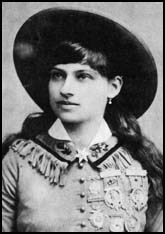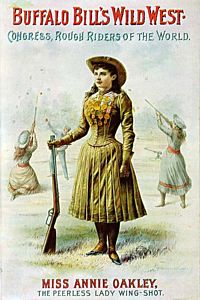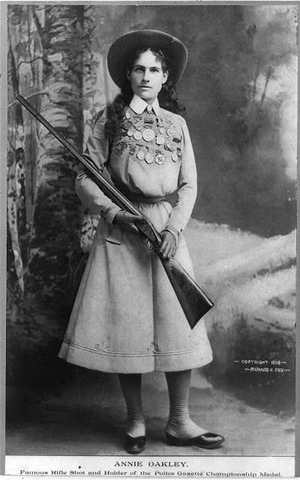THE STORY OF ANNIE OAKLEY
Well, wouldn’t you just know it. The story most of us know about Annie Oakley (“Little Sure-Shot”) was made up in Hollywood to cater to the accepted view of American womanhood in the early to mid 20th century. Let’s refresh ourselves on the version of Annie Oakley’s life as seen through the eyes of Hollywood, first. This version comes from the 1946 Broadway musical starring Ethel Merman, “Annie Get Your Gun”, later made into the MGM film of the same name, in 1950. There has also been a successful Broadway revival in 1999.
Here it goes: As the cocky and brash star of Buffalo Bill’s Wild West Show, little Annie falls madly in love with the dashing Frank Butler. Frank was attracted to Annie, too. But, according to the Hollywood version, when Annie defeated Frank in a shooting exhibition, he lost all interest in her, and began to pursue more “feminine” and softer ladies.
Little Annie was moping and desolate until her adoptive father, Chief Sitting Bull, sat her down and explained the “facts of life” to her; i.e., that men don’t much like girls who beat them at anything—especially at skills that are manly, like shooting. And so, the Chief tells Annie to forfeit the next shooting match between the pair of lovebirds, which she does. Naturally, Frank loves her lots better as a loser and he a winner, and they live happily ever after, with Annie tame and docile.
Well, that couldn’t be further from the truth. And the truth tells a remarkable tale of the early hardship that many women and children suffered during those times, and the remarkable resourcefulness and fortitude that overcame nearly insurmountable odds.
Annie Oakley was born Phoebe Ann Mosey (or Moses), in Darke County, Ohio, on August 13, 1860. She was only six years old when her father died after being caught in a blizzard. Destitute, her mother was forced to give Annie’s younger sister to another family, and she was up against it to take care of the ones who were left. The little family moved into the “Infirmary”, the county poor farm, and little Annie went to work for a farmer and his family. She was little more than a servant. Annie Oakley never referred to them by name, but called them ‘the wolves’, according to reports.
After two years, Oakley ran away and returned to the poor farm where she worked for the new superintendent as a seamstress. She finally returned home to her mother when she was fifteen. Soon she became the family breadwinner. Oakley appeared to always be drawn to guns. Her father may have taught her to shoot when she was very young. Reportedly, Oakley, herself, said that when she was barely big enough to lift her father's old Kentucky rifle, she dragged it outside, rested the barrel on the porch railing, and shot a squirrel clean through the head. And so, instead of going to school, she earned good money by shooting game and selling it to the Katzenberger brothers' grocery store, which shipped the game to hotels in Cincinnati. She soon was able to pay off the mortgage on her mother's house.
In addition to game hunting, Oakley entered local shooting contests that were popular at the time, winning so many turkey shoots that she was eventually banned from them. Her reputation was such that when professional sharpshooter Frank Butler was barstorming through southern Ohio in 1881, and claiming he could outshoot anyone around, the locals accepted his challenge and put up $100 to back an unknown at a shooting match to be held near Annie’s hometown. Frank would later tell newspaper reporters, “I almost dropped dead when a slim little girl in short dresses stepped out to the mark with me. ….I never shot better in my life; but never did a person make more impossible shots than did that little girl. It was her first big match, and my first defeat.”
It was love at first sight and the two were soon married. Butler traveled the variety circuit with his partner John Graham until one night when Graham became ill and Oakley became Butler's assistant, holding targets. Once when Butler was having an off night and could not hit his targets someone shouted, "Let the girl shoot!" over all the booing. Oakley took the gun and hit every mark.
She was a natural performer. Modest, yet playful, she skipped onto the stage like a schoolgirl. She shot an apple from Butler's head, pierced the heart in the ace of hearts or, if the card was held sideways, sliced through it; she shot corks from bottles and blew out the flames from candles. She shot backward looking through a small mirror. She could shoot just as well with her left hand as with her right. Sometimes she pretended to miss and pouted, stamping her foot. At the end of her act, she blew kisses to the crowd and did a funny little kick as she disappeared behind the curtain. The audience loved her.
Frank Butler faded into the background but didn't mind. Unusually open-minded about women he created a role reversal of a typical Victorian marriage of the times. And, he somehow instinctively knew that the best thing possible was to let her take the lead.
The first time Annie Oakley applied for a place in the Wild West show, Buffalo Bill turned her down because he already had a champion sharpshooter in Captain Bogardus. However, after the show's steamer sank on the Mississippi with all of his shooting equipment on board, Bogardus quit the show. Initially, Buffalo Bill was skeptical that a woman of Oakley's diminutive size had the endurance to perform every day, and he balked at paying her what she wanted. Buffalo Bill's Wild West show made Oakley a star. Although she was from the Midwest, she allowed herself to become an icon of the West, embodying the spirit, humor, and good graces of all Western heroes.
The great Sioux warrior Chief Sitting Bull was so impressed by Oakley's skill that he adopted her, and gave her the name "Watanya Cecilia"--"Little Sure Shot." Though her life inspired dime novels, a Broadway play, and Hollywood movies, little is known about the real Annie Oakley, an intensely private, complicated woman who excelled publicly in a man's sport.
Annie Oakley was a paradox. While she believed women should be active in sports, even teaching women to shoot free of charge, and spoke publicly about equal pay for equal work, she did not support women's suffrage. She was a Victorian woman who placed the utmost importance on being seen and treated as a lady, yet she excelled in a man's sport.
Near the end of her life, Will Rogers paid her a visit and then wrote about her in his daily newspaper column: "She was the reigning sensation of America and Europe during the heyday of Buffalo Bill's Wild West show. She was their star. Her picture was on more billboards than a modern Gloria Swanson. It was Annie Oakley, the greatest rifle shot the world has ever produced. Nobody took her place. There was only one."



